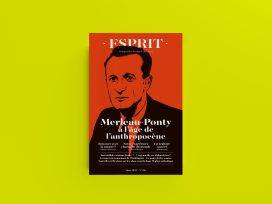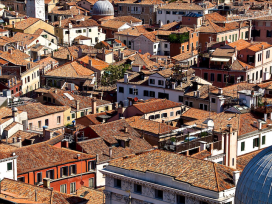Angry modernism
- Eurozine Review
6/2017
‘Springerin’ voices angry modernism from across the former USSR; ‘Arche’ reveals facets of Belarusian urban history; ‘dérive’ reports on housing crises and Main Street myths; ‘Historein’ traces nationalist narratives in Greek historiography; and ‘Esprit’ explores sex and sexuality after the revolution.
Springerin (Austria) 3/2017
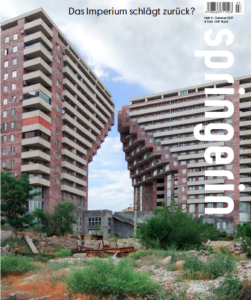
In an issue of Springerin on the controversial legacies of Soviet architectural modernism, Dimitrij Zadorin warns today’s architects against ignoring post-war functionalism, despite its ostensible lack of positive qualities.
The heyday of functionalism was reached in the early 1960s, when up to 95 per cent of all new housing in the USSR was standardized. By the end of the decade, the style fell out of favour and was replaced by monumentalism, particularly in city centres. To this day, however, residents often prefer functionalism’s ‘human’ dimensions. Functionalist housing, Zadorin writes, was the incubator of Soviet man and continues to be so, regardless of attempts to disclaim Soviet heritage. Architects need to take an interest in these increasingly decrepit structures to avoid an outbreak of social discontent.
Ukrainian modernism: Kharkiv is often referred to as the capital of Ukrainian constructivism. Since independence, however, Kharkiv’s modernist legacy has come under assault, writes Yevhenia Hubkina. This tendency culminated in last year’s attempt by the city government to erect an 86-metre column bearing an angel and an Orthodox cross in front of the legendary Derzhprom complex on Kharkiv’s Freedom Square.
Protests, however, saw the plan overruled by the courts. Modernism, writes Hubkina, ‘is not the mere ruin of a past civilization but continues to be an actor in contemporary life. Its ideas are not just amusing and its objects not just a pretty background for a photo album. The civilization of modernism has not vanished, because it stands above all civilizations and still follows a very clear goal.’
More articles from Springerin in Eurozine; Springerin‘s website
Arche (Belarus) 2/2017
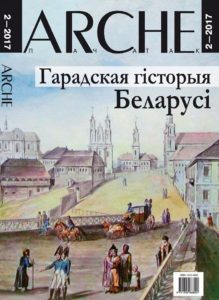
Good news from Belarus: starting with the current issue, Arche readers can buy the journal from state-run kiosks. This puts an end to the fifteen-year ban on the intellectual baby of founder Valer Bulhakau. For now, Arche is available only in Minsk, however the publishers are working to get it distributed across the entire country. The journal is one of the most important intellectual publications in Belarus, since 1998 concentrating primarily on questions of Belarusian history – questions repressed in the official discourse of the Lukashenka regime.
Urban history: Contributors to the new issue take a range of approaches to different epochs of Belarusian urban history, from the Lithuanian Grand Duchy and the Polish–Lithuanian Commonwealth to the Russian empire and the German occupation at the end of the First World War. The focus is not just on cities in the territory of modern Belarus, but includes cities such as Bialystok and Vilnius, which until the mid-twentieth century continued to have close connections with Belarusian regions.
Hrodna: The first contribution, by issue editor Natalya Slizh, offers a fascinating insight into the history of the western city of Hrodna through the famous veduta ‘Vera designatio urbis in Littavia Grodnae’ by Matthias Zündt and Johannes Adelhauser. The urban panorama way made for King Sigismund II (1520–1572) and was intended to emphasize the city’s European importance. From the sixteenth century onwards, the iconographic material of the print served as an important source for diplomatic relations, architecture, urban planning and trade, writes Slizh.
Also: David Frick shows how the Büchner family, Protestant traders in multi-confessional Vilnius in the sixteenth century, god-parented children belonging to families of other faiths in order to secure power in civic politics and enable communication between religions. Wieslaw Wrubel looks at the problem of urban sanitation in Bialystok on the basis of the construction of a plumbing system in the late-nineteenth century. And Dzenis Mironov analyses women’s fashion in Belarus during the first Soviet decade, exploring how socialist and folkloristic elements combined.
More articles from Arche in Eurozine; Arche‘s website
dérive (Austria) 7/2017

In dérive, sociologist Andrej Holm reports that, in Berlin, a ‘combination of demographic shifts, changing investment strategies and heavy cuts in social housing’ is responsible for drastic rent increases, leaving the city in a ‘state of emergency’. Informal settlements are one direct outcome of Berlin’s housing shortage. Niko Rollmann looks both at established camps – so-called ‘caravan sites’ – as well as ‘wild encampments’. While the former tend to have a political agenda and are tolerated by authorities, the latter emerge as a result of pure destitution.
An American myth: Main Street nostalgia is thriving in the Trump era, writes Frank Eckardt. In contrast to the supposed chaos, lawlessness and poverty of cities, the Main Street stands for small-town society with its common values, cultural homogeneity and national pride. ‘The Main Street, with its anything but harmonious past, becomes an anachronistic idea of controllability and transparency’.
More articles from dérive in Eurozine; dérive‘s website
Historein (Greece) 1–2/2017
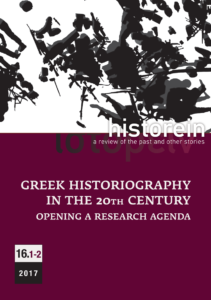
In an issue of Historein on twentieth-century Greek historiography, Manos Avgeridis discusses Greece’s very own ‘history war’ over the country’s wartime experience. The debate in Greece, he writes ‘has been compared to revisionist attempts and the discussion around them since the 1970s in Germany, France, Italy, Spain, Israel, or in Russia and eastern Europe after the collapse of the socialist regimes’. The process of dealing with the legacy of the 1940s is multifaceted – so much so that ‘fiction, through its different expressions, has also staked a claim to truth and truthfulness’.
Greek nationalism: Emilia Salvanou reviews the historiography of WWI and of the Greek–Turkish War of 1919–1922 and the ensuing refugee crisis. She explains that, in Greece, ‘Asia Minor refugees are perceived as the archetypical victims of a supposed primordial Greek–Turkish enmity – a concept deeply woven into the founding myths of the Greek nation – that culminated after Greece’s defeat in Anatolia.’ Referring to numerous works in the interwar, postwar and post-1974 democracy periods, she traces the ways in which historians and memoirists have shaped the Greek narrative.
‘The most important contribution of nationalism’, Salvanou concludes, ‘should not be sought in the origins of the war, but in the configuration of the postwar world and in the shaping of the ways the past was conceptualized and the frames in which it is conceived.’
Global history: George Iggers takes in a broad view of historiography globally, comparing trends in the twentieth and twenty-first centuries. He notes that the professionalization of history ‘also led to the exclusion well into the late twentieth century of women, Jews and ethnic minorities, not only from positions in academic institutions but also as subjects of historical study.’ Discussing the impact of Marxist approaches to history, he notes that, ‘in China, despite the official Marxist ideology of the communist government, for many historians the modern West represented a goal to be approximated.’
More articles from Historein in Eurozine; Historein‘s website
Esprit (France) 7–8/2017
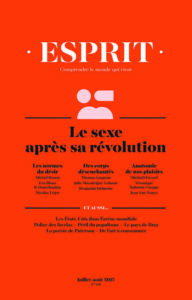
In Esprit, Julie Mazaleigue-Labaste looks at how what once were considered sexual perversions have come to be viewed as different forms of sexuality. ‘The destiny of perversion is political: it intermingles the history of liberalism, individualism and democracy.’ The obvious instances of homosexual and transgender politics have fundamentally shifted attitudes; now, a ‘pervert is someone whose sexual behaviour is harmful to others’.
Sartrian ‘intersubjectivity’ and liberal contractualism – where both parties receive a mutual benefit – have been used to exclude exhibitionism, voyeurism, sadism, masochism and fetishism from the norm, argues Mazaleigue-Labaste. Homosexuality, on the other hand, has been ‘de-psychiatrized’ and destigmatized. Modern liberal values have moved the debate on immeasurably from the distinction made by the criminologist Alexandre Lacassagne, who argued in the late-nineteenth century that ‘major perversions must be repressed at all costs; smaller ones may quite literally gain civil respectability’.
Exile: Khaldoun Nabwami writes about exile from his own experience as a member of the persecuted Druze minority in Syria. ‘My homeland’s soil no longer holds any force of attraction on my body or soul; it will never be a refuge for me again.’ Yet, he is a stranger in France too, more Plato’s Sophist than Camus’s Outsider. ‘I have never felt so foreign as in the French university environment,’ he writes. Outsiders are frozen out by the western elite: ‘In this world, stranger, you are not really thought about and never taken seriously.’
America first? Laurence Nardon tries to make sense of Trump’s foreign policy. After an initial ‘Jacksonian’ approach prioritizing American interests and intervening only when national security interests were at stake, U-turns on China and Syria suggested a shift. Alas, recent policy announcements imply a view of the world as ‘a Hobbesian arena in which the principal international actors are in competition’.
More articles from Esprit in Eurozine; Esprit‘s website
The Eurozine Review presents a selection of the latest issues of Eurozine partner journals, summarizing their contents in English as a way of encouraging cultural and political dialogue between national public spheres in Europe.

Published 11 August 2017
Original in English
First published by Eurozine
Newsletter
Subscribe to know what’s worth thinking about.


